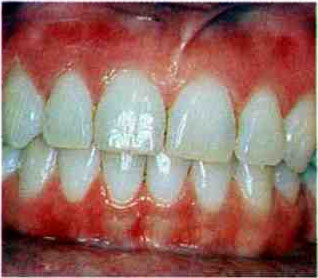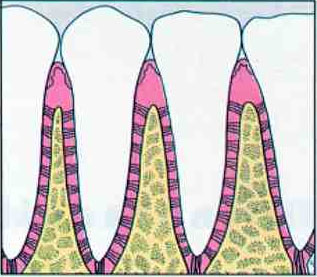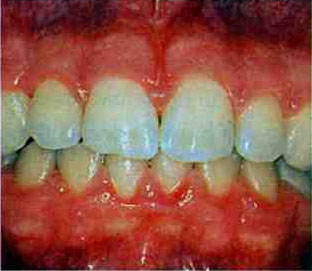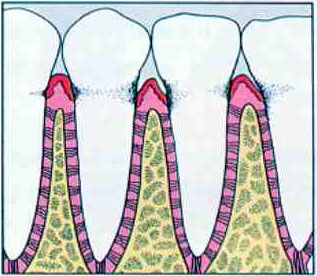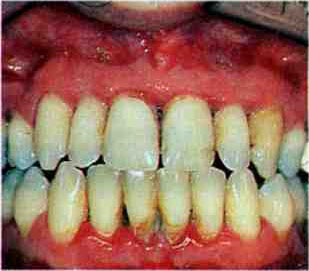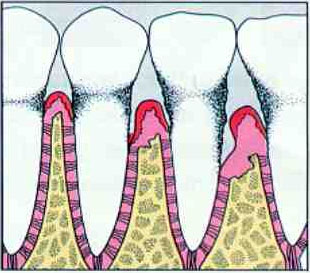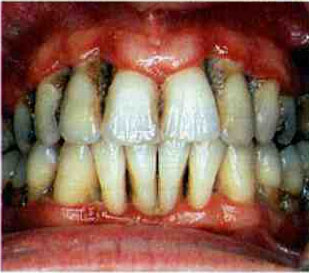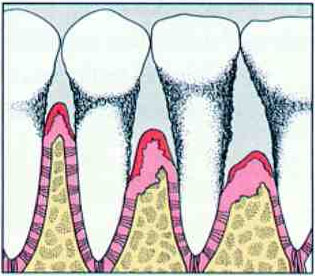Periodontal Disease
|
Periodontitis Stage One
Stage Two
|
Contrary to popular opinion, periodontal disease, not tooth decay, is the chief cause of tooth loss in adults. To maintain good oral health, it is essential that you take the initiative to prevent this serious, and often hidden disease. Treatment of periodontitis depends upon how much damage the disease has caused. In the early stages (i.e. gingivitis), the dentist or periodontist will use deep cleaning techniques, known as scaling and root planing, to remove hardened plaque and infected tissue under the gum and smooth the damaged root surfaces. This allows the gum to re-attach to the teeth. A special mouth rinse or an antibiotic might also be prescribed to help control infection. Surgery may also be required if periodontitis has destroyed a significant amount of the gum and/or bone tissue. Once scaling and root planing have been performed, a simple curretage may be performed where infected gingival tissue is excised from the surrounding healthy tissue. Or, a flap surgery may need to be performed, where the gums and bone are excised of infected tissue, the bone is reshaped, and then the tissue is realigned and sewn back in place. |
|
Stage Three Stage Four
|
While periodontal disease can be controlled, there are external factors which play a role in adding certain risks to an occurrence or recurrence. These are: . DIABETES Diabetes can affect the lining of the blood vessels, thickening them. This thickening in turn causes the transfer of oxygen to the cell and waste from it to slow down. By slowing down this process, diseases like periodontitis can grow and infect the entire oral cavity if not treated. It is especially important to be vigilant in your daily oral hygiene regimen if you suffer from diabetes. And be sure to ask us for any up to date preventive measures that you can take, so your smile will always be with you! . TOBACCO It is a clinically proven fact that people who smoke are at a much greater risk of an occurrence of periodontal disease. As much as five times greater risk than a non-smoker. And the chemicals associated with smoking cause other detrimental effects such as heart disease and cancer. Smokeless tobacco is even more of a culprit when it comes to periodontitis. Those who dip |
First, a diagnosis must be made. Dr. Stojanovic may refer you to see a specialist. Let him decide if specific treatment by a periodontist is necessary.
Once you accept the treatment plan it will become necessary to make changes in certain oral habits so that the doctors work brings about a swift cure, and there is no recurrence of periodontal disease. The most common mistake made by those receiving periodontal treatment is that it will "cure" their problem for good. This is an easy assumption to make when you consider that most other dental work, other than orthodontics, is considered "permanent" to one extent or another. But periodontal disease very easily reestablishes it's foothold, making prevention a lifelong ambition.
Most importantly, if you have or suspect that you have periodontal disease, don't put off seeing us. Fiesta Dental Care can provide the absolute best care with our professional techniques, and a minimum of pain, if the disease is caught in it's early stages. Your smile is definitely worth the time and effort you put into keeping it healthy and bright!

